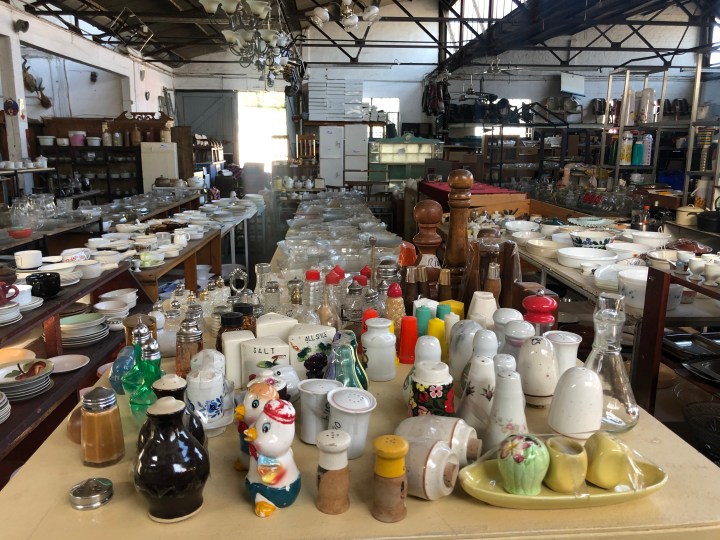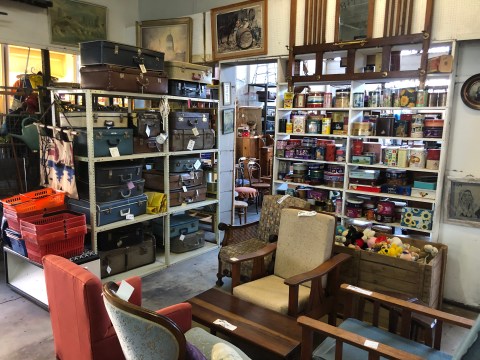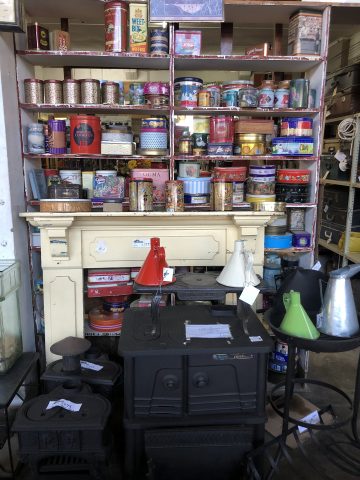KAROO DREAMING
Gavel & Greed: Time gives back what green-eyed vultures have taken

Every Karoo town has its junk shops. But one person’s discards are another’s treasure. Trawl through these and you’re trawling through lives once lived, now gone. The journey starts and ends with the spices. They punctuate the roads and detours along the way. And there they are in my kitchen cupboard right now. The spices of life.
Auctions and removal trucks. Gavels and men with false smiles hammering down the chairs, toys and bedside lamps of people’s lives, picking their way through your days and years like heartless magpies. Beady-eyed people staring each other down to get your treasure for their bargain price. I’ll have that, thank you. But it’s mine, that’s my … never mind. Pickfords and Stuttafords Van Lines pantechnicons loading up your life and moving it from familiar place to mysterious future. From the only house you’ve known to who knows where.
There’s something mean and miserly about an auction. They reveal the greed and empty heart of the covetous. I don’t mean the Sotheby’s kind, where grand antiques and rare finds fetch fabulous prices. That’s another world altogether and there’s joy to be had in it, or at least entertainment. I mean the kind of auction where everything you’ve ever touched in your home in your whole life is up for grabs, and gaggles of strangers are engaged in silent battle with one another to get their grasping paws on the things that have coloured your life, for as little outlay as possible. Your prized possession, their knockoff.
When I think about auctions my mind goes back to one night in July 1969 when my mom must have been in our kitchen in the house at 38, 13th Avenue in Oranjemund. Maybe she made a meat and potato pie that night, flavouring it with Robertsons mixed herbs and a teaspoonful of Colman’s hot English mustard. The pie with the shortcrust pastry she made herself and the gravy that poured out when you cut into it, served with the mashed potatoes that were her favourite food. I wonder if she’d remember what she cooked that night if she were here today as I write, the 2nd of November. It would have been her 97th birthday. The kind of day when the son thinks back; I wish I hadn’t said that, I wish I had said this…
Perhaps she cooked the last rice pudding she’d make in the old oven, in the oblong enamel dish she always used for it, sprinkling cinnamon on top from another Robertsons spice jar. They might have had bacon and eggs for the last time at the kitchen table the next morning, before being picked up to be taken to the X-ray building, because you couldn’t leave town without being X-rayed in case you had sewn diamonds into your hems or swallowed them. And the son, oblivious in his Windhoek boarding school hostel 700 miles away.
There was no auction that day, but it was the first step on the inexorable path to one. Mom and dad had written to say they were driving up to Windhoek and we were going to Swakopmund on holiday. What I remember most clearly about that visit, other than the hotel right on the beach and the grandly Germanic steep roofs, was the pub in the Hansa Hotel. There was a woman at reception whom my dad had immediately engaged in conversation. Where’s your husband today? She went quiet. In almost a whisper, choking up, she said he’d died in the plane crash, then crumpled into sobbing and ran from the room. In my dad’s defence, how could he have known.
I choked up too. Everyone knew about that plane crash. I’d heard it in April the year before. It was 8.50pm and we were in bed in the hostel, lights out. There was a boom somewhere in the distance. Like a bomb. Next day we learnt that an SAA flight from Johannesburg to London Heathrow had crashed a minute after takeoff from a scheduled Windhoek stopover, killing 123 of the 128 on board. I know it happened on the 20th of April 1968. It was my 13th birthday, and the day the woman’s husband died having boarded the plane to London.
Days later, an odd thing happened. At the end of the holiday we drove south and south and south. Oranjemund, where we lived, is reached by turning right at Steinkopf, just before Springbok, but dad kept on driving the off-white Ford Cortina GT with the red flash, past Springbok and on past Kamieskroon, Garies and Bitterfontein, on towards Vanrhynsdorp and beyond Klawer to Clanwilliam, Citrusdal, Piketberg, on and on, and the car so quiet. Any attempt to ask what was going on was shushed. None of the joyful exchanges of the holiday when everything was a distraction from whatever it was I didn’t know about. The weisswurst and mash in the hotel dining room, the steak and eggs for breakfast.
“We’re going to Cape Town” was as much as I could prise from them before they’d clam up. A drink in a hotel in every town wasn’t the usual chatty, happy affair. Even if I had by then started to wonder if the inevitable gin and Oros or brandy and ginger ale was really the best idea, what with all the driving. I was growing up and starting to think for myself. But I’d shut up and drink my cola tonic and lemonade.
When we drove into Cape Town the following morning we didn’t go to the usual places, the Bay Beach Hotel in Mouille Point opposite the Putt-Putt, where I relished the poached fish with its pink sauce and the suprême of chicken with its golden skin, or the pinkly grand Ritz in Main Road, Sea Point where the gins and Oroses and brandies and ginger ales were sipped on the long verandah. We drove instead through Koeberg Road to the Cambridge Hotel in Milnerton. Then my sister and brother-in-law arrived and they all drooped into grim, whispered conversation with me on the sidelines. But I’d figured it out by then. They’d left Oranjemund and we weren’t going back. It was years before I worked out the deeper truth, that my dad had been fired for his alcoholism and would never hold down a job again. That part became clear very quickly.
Three weeks later we moved into a two-bedroom flat in Milnerton North. One day a big Pickfords truck arrived. Men in overalls brought Joko Tea crates of our goods that had been packed up in our old house and unpacked them in the flat’s little kitchen. My clearest memory of everything that was unpacked in every crate in every room was the green-and red-topped Robertsons spice jars, half empty, or two thirds full. It was as if they’d been frozen in time the last time I looked in the kitchen cupboards at 38, 13th Avenue, and here they were in this strange new world. What a strange thing to keep. Wouldn’t it have been cheaper to throw them out and buy new ones in Cape Town? Even now, I think of them when I realise that some of the Robertsons spices in my present kitchen cupboard have been there for a while, despite how much I use them. And I do, by the way: dried herbs and spices are among the best culinary devices of the modern age; but I do grow my own as well.
Time moves on, you adapt. My favourite food became smoked snoek bought after school from the Pick n Pay at Adelphi Centre in Sea Point. I’d pick at it on the way home. My second favourite food was curried beef and vegetables you bought in cans in those days. I didn’t even heat it up. Come on, any true curry lover knows that next-day cold curry is even better. By now my mother was for all intents and purposes a single mom even though they weren’t yet divorced. She did the best she could, worked hard for low pay. But bad turned to desperate.
Three years after our arrival came the auction, when everything had inexorably spiralled down to the inevitable. Mom and I had had the idea that we’d have enough from the proceeds to get to England and find our relatives. That I’d avoid the looming call-up was also never far from my mind. The Cortina had been sold, that money had been frittered away by dad paying the bills between pointless jobs and, inevitably, everything we ever owned was headed for auction. One item I always see in my mind is my little policeman bedside lamp being shoved into a crate. When we’d got to Cape Town three years earlier dad had bought everything new; the three-piece suite, display cabinet, radiogram, fridge, stove, beds, the works. Everything went. Mom and I ended up in one room upstairs in a boarding house in Green Point. There hadn’t been enough for the fares we’d hoped for. The military would eventually find me, and I didn’t get to come back as “an exile” in 1994.
So, why I hate auctions must be clear by now. But, strangely, I have come to benefit from them, indirectly, since we moved to Cradock. Maybe it’s Life showing her ironic sense of humour. Fate saying, tell you what, you can have something back. There’s this place…

Tins, chairs, the suitcases people carry through their long lives. Fluffy toys and the bits and pieces of other people’s days. (Photo: Tony Jackman)
There’s a great big shop in Cradock called More4Less, though locals call it Less4More. Shop? Imagine a warehouse, no, a hangar, filled wall to distant wall and floor to ceiling with secondhand furniture, ornaments, crockery, garden goods, tools, bicycles, fridges, stoves, fire grates, anything and everything that’s ever populated a home and garden. That’s More4Less, and more.
The goods come, largely, from deceased estates, as is the way of such things. People go, they leave their goods behind, the heirs sell it all off. The owners of businesses such as More4Less get called in. It’s honest toil. Rather that than the miserly gavel and the green-eyed death vultures craving your stuff.
There’s life in it, abundant life, once lived. Everything on every shelf, table, wall or even hanging from the ceiling at More4Less has been touched by another hand, been eaten from by a mother, a son, every gebak has been stirred in by a tannie, every armchair been lounged in by real people watching TV or having tea when their friends popped by to kuier. Cereals were scraped by spoons in that old bowl by little boys and girls before getting the bus to school; Oom Hannes sliced his lamb roast on that board; Tannie Elsa loved laying that tablecloth on that big oak table over there, and they both came here from the same deceased estate.
I sometimes wonder if I’ll ever spot a blue and white policeman lamp like the one that had sat on my Oranjemund bedside table. I’d pay any price for it, after bargaining them down of course. And I finally replaced my mom’s big beige baking bowl. In fact I have three now. If I see one I buy it. It’s become a compulsion. And I always bargain them down. I take no shame in doing it either. No compunction at all. We all deserve a turn at the wheel of life.
When we took over Schreiner’s Tea Room on first moving to Cradock, all our stuff in another long haul movers’ truck, I bought scores of dinner plates from More4Less, little vases for table settings, coffee plungers, soup and dessert bowls, milk jugs, teapots, trays of old cutlery; ramekins and napkin rings, bread and muffin tins. I became the magpie taking things back.

I must pop in to buy a new fire grate one of these days. (Photo: Tony Jackman)
Shopping at More4Less, and I pop in often, feels like an auction reversed. Things once owned by people who have gone, now being picked up and taken into other homes to be used again; the grasped bargain as someone else’s treasure in new hands.
Trawling through these memories brings the realisation that my association with auctions as a teenager is what made me prefer the things of old over the shiny-bright modern. The tarnished, the faded; goods enhanced by time and the touch of other hands. Something of the character of the past owner rubs off them and is transferred to you. I’m taking back what was taken from the younger me. DM/TGIFood
Tony Jackman is the Galliova Food Champion of the Year 2021. His book, foodSTUFF, is now available in the DM Shop. Buy it here.
SUBSCRIBE: There’s much more from Tony Jackman and his food writing colleagues in his weekly TGIFood newsletter, delivered to your inbox every Saturday. Subscribe here. Also visit the TGIFood platform, a repository of all of our food writing.






 Become an Insider
Become an Insider
Comments - Please login in order to comment.